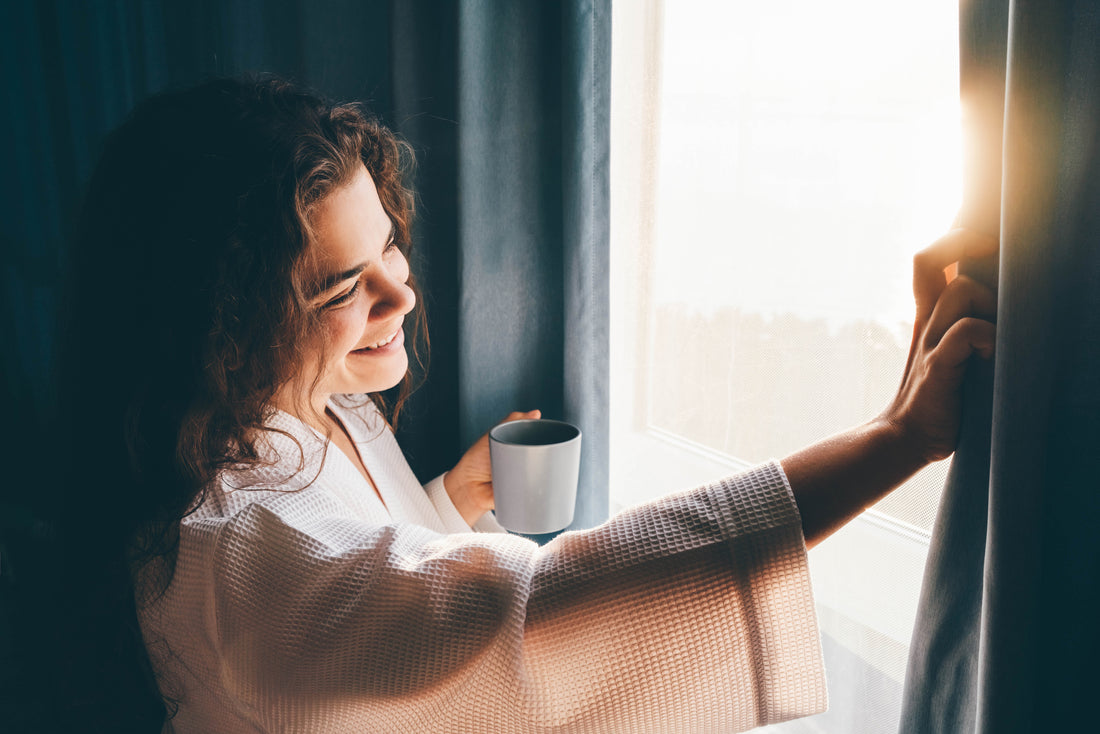How To Need Less Sleep: 10 Tips for Staying Refreshed

No matter how much we may love sleeping, sometimes, it's necessary to sleep less. Nobody wants to sleep less, but there are situations when life just gets in the way. Perhaps you need to stay up late to finish a work project, have an early appointment that needs travel, or want to have a few extra hours to work on an exciting project or side hustle. Reducing sleep time can be challenging, and you need to be very careful when doing it.
The problem with reducing sleep time is that the human body needs adequate sleep to function, meaning balancing these essential needs can be difficult.
However, while not advised, it's not impossible either. There are ways to train your body to sleep less. These include gradually reducing sleep time and setting a sleep schedule.
In this article, we'll look at why you may wish to try and sleep less and whether you can train your body to sleep less. However, we'll also look at how much sleep you need and some of the health consequences of getting less sleep. Finally, we'll give some tips on how to need less sleep and what to do if you have trouble waking up in the morning.
Reducing Sleep Time: How Much Sleep Do We Need?
Most people need around eight hours of sleep per night. However, some people may need more or less sleep. For example, older adults generally need less sleep than younger adults. The amount of sleep you need depends on several factors, including your age, lifestyle, health, and whether you're pregnant.
How Much Sleep Do You Need?
The National Sleep Foundation recommends that most adults need between 7 and 9 hours of sleep daily.
Newborns: Newborns usually sleep for 16 to 18 hours a day.
Infants: Infants typically sleep for 14 to 15 hours a day.
Toddlers: Toddlers usually sleep for 12 to 13 hours a day.
Preschoolers: Preschoolers sleep for about 11 to 12 hours a day.
School-aged children: School-aged children usually sleep for 10 to 11 hours a day.
Teens: Teens sleep for about 9 to 10 hours a day.
Adults: Most adults need 7 to 8 hours of sleep a day.
Older adults: Older adults usually sleep for 7 to 8 hours a day.
How Much Sleep Do Athletes Need?
Depending on the intensity and duration of their training, athletes may need more sleep than the average person. For example, long-distance runners may need 9 or 10 hours of sleep per night, while sprinters may need only 8 hours.
How Much Sleep Do Pregnant Women Need?
Pregnant women usually need more sleep than they did before they were pregnant. This is because of the physical and emotional changes they experience during pregnancy.
Most pregnant women need about 9 hours of sleep per night.
Why Do We Need Sleep?
There are several reasons why sleep is essential for our health. For example, sleep:
Helps to restore and repair our bodies: During sleep, our bodies produce hormones that help to repair cells and tissues.
Regulates our moods: Lack of sleep can lead to irritability and moodiness.
Improves our immune system: Sleep helps to fight off infection and illness.
Increases our energy levels: Sleep provides our bodies with the energy they need to function correctly during the day.
It helps us to focus and concentrate: sleep helps improve our attention span and concentration.
Reducing sleep time can therefore have some negative consequences for our health. Let's look at some of these in more detail.
The Health Effects of Sleep Deprivation When You Sleep Less

There are several health consequences associated with not sleeping enough. These include:
Weight gain: Studies have shown that people who sleep less are more likely to be overweight or obese.
Diabetes: Not sleeping enough can increase your risk of developing type 2 diabetes.
Heart disease: sleep deprivation can lead to high blood pressure and an increased risk of heart disease.
Stroke: Not sleeping enough can increase your risk of having a stroke.
Mental health problems: sleep deprivation can cause or worsen anxiety and depression.
Impaired judgment: sleep deprivation can impair your ability to make decisions and solve problems.
So, as you can see, there are many reasons why you may not want to sleep less.
Four Reasons You May Wish to Sleep Less and Four Reasons You Shouldn't
There are many reasons why you may want to sleep less. These include:
You have a lot to do and not enough time to sleep: This is a common reason why people sleep less. They feel like they have too much to do and not enough time to sleep. However, this can lead to problems such as impaired judgment and decision-making and increased stress levels.
You want to sleep less so you can party more: Some people sleep less so they can stay up late and party. However, this can lead to problems such as dehydration, sleep deprivation, and a hangover. It's important to party responsibly and ensure you get enough sleep.
You want to sleep less so you can watch more TV: Some people sleep less so they can watch more TV or stay up late to watch something special such as a season finale. This can be a particular issue for those watching live sporting events streamed from the United States, such as WWE, UFC, or the NFL. However, this can lead to the usual problems associated with sleep deprivation. It's important to find a balance between sleep and TV time.
You want to sleep less so you can work more: Sleeping less to work more can lead to problems. It's essential to find a balance between work and sleep. It would help if you also took breaks during the day to rest and relax. While some may find it necessary to work extra though commitments at their workplace or financial constraints, it's important not to work to the point of sleep deprivation.

There are also many reasons why you may not want to sleep less. These include:
You need sleep to function properly: As we've seen, sleep is essential for our health and well-being. It helps to restore and repair our bodies, regulate our moods, improve our immune system, and increase our energy levels.
You need sleep to avoid health problems: As we've also seen, not sleeping enough can lead to several health problems, such as weight gain, diabetes, heart disease, stroke, mental health problems, and impaired judgment.
You need sleep to be productive: Sleep is essential for productivity. It helps us to focus and concentrate. Losing focus can result in errors and accidents. Should these involve other people, you may be held legally responsible.
You need sleep to feel good: Sleep is vital for our emotional well-being. It helps us to feel rested and refreshed. Mental health is often overlooked when it comes to sleep, but it's just as important as physical health.
How to Function on Less Sleep - Ten Tips
There are many things you can do to help you function on less sleep. These include:
1. Get Into a Good Sleep Routine
This means going to bed and getting up at the same time each day. This will help to regulate your body's sleep cycle. This routine is essential as it will help you feel less tired during the day. Adjust your schedule by a small amount each day until you reach your sleep goal.
For those looking for how to sleep less, achieving this routine and keeping it going can be one of the most challenging things. It can often be helpful to set the alarm for bedtime and wake-up time. This will help you to stick to your sleep schedule.
2. Be Smart With Caffeine
Caffeine is a stimulant and can make it difficult to sleep. It should be avoided in the hours leading up to bedtime. It would be best if you avoided it immediately and instead saved your morning caffeine boost for a few hours after waking. This is when your energy levels begin to dip.
It may seem like taking excess caffeine is a good idea when you're thinking about how to function on less sleep. However, this will only lead to you feeling more tired later on. The goal is better sleep for less. If you want to sleep less, try limiting caffeine to one cup of coffee a day. You can also try drinking tea, which contains less caffeine than coffee. And be sure to avoid caffeine later in the day, as it can interfere with your sleep.
However, it is crucial not to cut out caffeine completely. This can lead to withdrawal symptoms, such as headaches and irritability. A better approach is to drink it in moderation and at the right times.
3. Get Some Sunlight
Sunlight helps to wake us up and can give us a much-needed energy boost. Try to get sunlight first thing in the morning and throughout the day. This will help to keep your energy levels up.
Getting some sunlight can be very helpful for those wondering how to need less sleep. Plus, it's bound to improve your mood, which is a bonus.

4. Take Breaks
Sitting for long periods can make us feel tired and sluggish. Make sure you take regular breaks throughout the day to move around and stretch your legs. This will help to improve your circulation and energy levels.
If you're in the process of reducing sleep time, taking breaks can be extremely helpful. They allow you to move your body and wake yourself up a bit.
5. Exercise
Exercise is a great way to stay awake and alert during the day. It gives you an energy boost and helps to improve your focus. If possible, try to exercise for at least 30 minutes a day. Exercise is also good for you in general, with a plethora of health benefits.
Some quick exercises you can easily do on a break include:
- Jumping jacks
- Squats
- Pushups
- Sit-ups
- Running in place
You can't go wrong with exercise, and if you're searching for ways to sleep less, it should most definitely be on your list.
6. Eat Healthily
Eating sugary snacks or processed foods can make us feel tired. Instead, try to eat healthy meals high in protein and complex carbohydrates. These will give you sustained energy throughout the day.
Healthy foods that give you energy include:
- Oats
- Bananas
- Eggs
- Chicken
- Leafy greens
Getting better sleep for less can be a struggle, so keeping up your overall health is vital. Eating right is a big part of that. So, if you want to know how to sleep less, ensure you eat the right foods.
7. Drink Plenty of Water
Dehydration can tire us, so drinking plenty of water during the day is important. Aim for eight glasses of water a day or more if you can. The benefits of hydration are numerous, so it's a good habit.
When thinking about how to function on less sleep, hydration is key. It can be easy to forget to drink water when you're sleep-deprived, so always keep a water bottle with you. There are also many hydration apps available that can help you to stay on track and help train your body to sleep less.

8. Take Power Naps
This may seem like you'd be defeating the objective when looking at how to need less sleep. However, power naps can be very helpful. They help to improve your focus and energy levels. Just ensure you keep them short, as naps that are too long can make you feel more tired.
The best time for a power nap is usually early afternoon, around 2:00 pm. This is when your energy levels start to dip again.
9. Vary Your Activities
Keeping the mind alert and active is an integral part of how to function on less sleep. Boredom can make us feel tired, so it's important to change up your activities throughout the day.
Some things you can do to stay alert and avoid boredom include:
- Working on different tasks
- Taking walking breaks
- Listening to music or podcasts
- Chatting with co-workers
- Getting some fresh air
If you want to get better sleep for less, it's essential to keep your mind active. This will help to prevent you from feeling bored and exhausted.
10. Consider Supplements
Several supplements can help improve focus and energy levels and help you learn how to function on less sleep.
Some supplements that can help you stay awake and alert include:
- Caffeine
- Creatine
- Zinc
- Iron
- B-vitamins
If you're looking for ways to sleep less, supplements can sometimes be helpful. Make sure to speak with a doctor before taking anything, as they can interact with other medications you may be taking.
What If You Don't Feel Rested in the Morning?
One of the biggest challenges to reducing sleep time is ensuring you still feel rested in the morning. This can be difficult, even when you've implemented our tips on how to sleep less. However, taking our final point into consideration, there is one supplement that can help.
If you're wondering how to function on less sleep, waking up the right way is vital. And that's where B・SYNC ON comes in.
B・SYNC ON is the world's first wake-up tablet that has been clinically proven effective in improving your wake-up process. Made with only four all-natural ingredients, B・SYNC ON helps people wake up feeling refreshed thanks to our innovative delayed-release capsule. So if you're looking to wake up gradually and effortlessly, and enjoy lasting benefits throughout the day, consider what B・SYNC ON can offer.
Conclusion: Better Sleep for Less
There are many ways that those asking how to need less sleep can achieve their goals. It is possible to train your body to sleep less by making some lifestyle changes, such as cutting down on caffeine, exercising regularly, and keeping a sleep journal. However, it's important to remember that cutting sleep is bad for your health and can lead to serious consequences. So if you're looking for ways to get better sleep for less, make sure you do so safely. And always speak with a doctor before making any changes to your sleep habits.
FAQs
Can you train your body to sleep less?
Yes, it is possible to train your body to sleep less. However, it is important to do this safely. What we mean by this is that you should not sleep less than your body needs. This can lead to the problems we've mentioned above.
How long should I be reducing my sleep time for?
It would be best if you only were reducing your sleep time for a short period. If you're sleep-deprived, you may need to sleep for longer periods to make up for the lost sleep. If you're wondering how to need less sleep, speak with a doctor before making any changes to your habits.
What are the risks associated with less sleep?
There are many risks associated with sleep deprivation, including impaired judgment, mood swings, and an increased risk of accidents. Sleep deprivation can also lead to serious health conditions such as heart disease, obesity, and diabetes.







